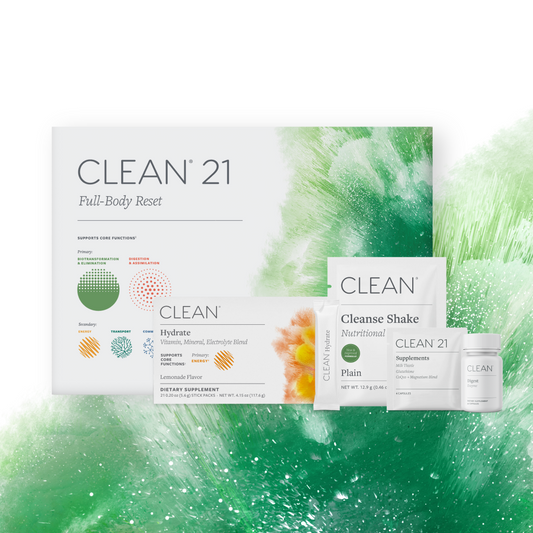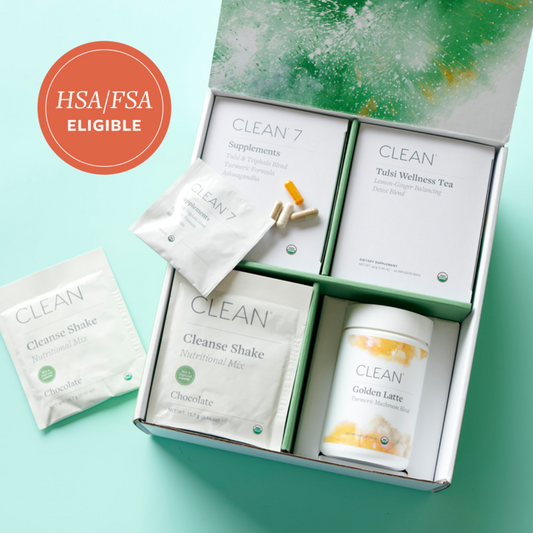
Natural Remedies For Anxiety That Actually Work

Natural remedies for anxiety are out there to help you find healthy solutions for teeth-grinding, heart-pounding, stomach-churning stress. Anxiety can be situational, like before giving a big presentation, and it can also be chronic, like hormonal imbalances like Polycystic Ovary Syndrome (PCOS), generalized anxiety disorder, and more.
Whatever the case, experiencing anxiety is unpleasant. Not to mention that it can interfere with our daily lives, like preventing us from being social, reducing our work productivity, and causing rifts in our relationships.
Luckily there are many natural remedies for anxiety to help us reduce or even prevent it. Often some simple changes (such as adding a Daily Shake to your routine) can make a world of difference. That’s why we’re sharing some of our favorite healthy approaches.
Top natural remedies for anxiety
Vitamin D
A super vitamin (actually, a hormone precursor) that is often deficient in those of us not living with year-round intense sun exposure, this vitamin packs an anxiety-reducing severe punch. Having low vitamin D levels in the blood could be a risk factor for anxiety.
Of course, on the topic of hormones, we have to mention PMS. Vitamin D could help with premenstrual anxiety and other mood disturbances.
Vitamin D is difficult to get through food, and the best dietary source of vitamin D is seafood. Beyond this, organic, pastured eggs can provide some vitamin D, as well as mushrooms. Otherwise, opt for a vitamin D supplement to combat vitamin D deficiency.
B vitamins
All the B vitamins are helpful, but specifically, B5, B6, B9 (folic acid), and B12 are natural remedies for anxiety and can help regulate mood. B5 helps to reduce stress and manage adrenal gland function. B6 helps to regulate mood and reduce bloating. B9, or folic acid, helps to protect our hearts. Heart-malfunction risk increases with age, poor lifestyle choices, and high-anxiety lifestyles. Lastly, B12 is essential and often deficient in women experiencing mood disturbances, such as anxiety and even depression.
Food sources of B vitamins include kale, spinach, collard greens, lentils, bell peppers, liver, eggs, almonds, walnuts, sardines, oats, and sea vegetables.
Reishi mushroom
The most understood component of reishi mushroom, or Ganoderma Lucidum, is Triterpenes. These compounds have hormone-like qualities and can work on allergies, blood lipids (fats), and the endocrine and nervous systems.
In one study, individuals consuming reishi for eight weeks showed less fatigue and an increased sense of well-being. It even managed to lessen anxiety, depression, and fatigue. Other adaptogenic herbs, such as Ashwagandha, have also proven to reduce stress.
Passionflower
The calming and relaxing passionflower is a herb with a long history in South America. It has been used for everything from epilepsy, anxiety, insomnia, and panic attacks. Passionflower is often combined into a formula known as VSP — valerian, skullcap, and passionflower. The three combined to make a potent tincture for anxiety and sleep issues. If our blood pressure becomes elevated due to constant stress in our life, passionflower could be helpful.
Skullcap
A member of the mint family, skullcap has a wide variety of uses, including headaches, nerve tremors, stress, menstrual tension, insomnia, and nervous exhaustion. Occasionally we find we are feeling so flat and exhausted but still have trouble sleeping at night because of our anxious minds, and skullcap is an excellent remedy to try. Like valerian, skullcap can be used safely for long periods if necessary. If you want to take advantage of the menstrual-easing benefits of this herb, combine it with chamomile, raspberry leaf, and nettle leaf.
Stress reduction
Stress happens for many reasons and manifests in the body in many ways, and one of those common manifestations is anxiety and other mood problems. The key aim when dealing with anxiety is to reduce our stress in any way possible, as often as we can. This means incorporating some form of self-care into our daily routine every single day, without fail.
Those times when we are super stressed and think we don’t have time for self-care are precisely the times when it’s most needed. It needn’t take all day either — anything from five minutes to several hours a day, depending on your schedule and needs. Here are a few ways to get started:
- Yoga
- Meditation
- Gratitude journaling
- Adult coloring books
- Chatting with a friend
- Spending time in nature
- Reading a “fluff” novel
- Watching a comedy show or movie
- Taking a hot bath
- Using essential oils like lavender, clary sage, chamomile, bergamot, or ylang-ylang
- Spend time in or around a body of water like a stream, lake, or ocean
- Gardening
- Take a five-minute “breath break” in between activities like before you come in the house after work
- Napping
Eliminate Food Sensitivities
Food sensitivities or intolerances have been getting a lot of hype in the last few years. There is some merit to this, as foods that cause an inappropriate immune response can end up hurting your body in many ways, from hormonal imbalances to anxiety, weight gain, and lack of concentration.
Anxiety often coincides with feelings of fatigue, even though you may be sleeping for long hours, because the offending foods are consistently in your diet, aggravating your system. Women with extreme anxiety often become suddenly calm, peaceful, and uplifted after removing the offending foods from the diet.
The most common food sensitivities to watch out for are dairy, gluten (wheat), soy, cane sugar, chocolate, and corn. There are many others, and essentially anyone can be sensitive to any food, depending on your system. Try removing these foods from your diet for a period of three to six weeks, and slowly reintroduce them one by one to see the effect. If one of the foods contributes to anxiety, it will become apparent when it’s reintroduced.
Try not to get more anxious thinking about which remedies to try! Pick one of these natural remedies for anxiety, and try it for a few weeks. Add in others, or change it up as needed!
Written by Robyn Srigley
If you enjoyed this article, you might also like The Top Ten Benefits of a Cleanse






